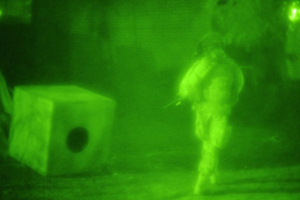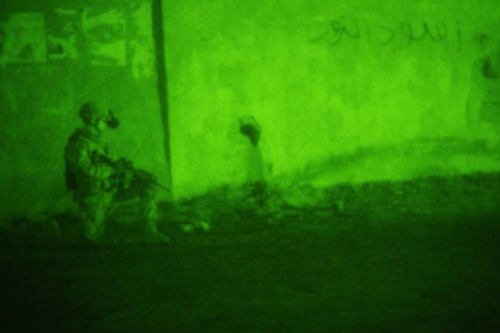Credit: 3rd Stryker Brigade Combat Team, 2nd Infantry Division, February 5, 2010
Sgt. George Applegate, a fire team leader for 2nd Platoon, Company C, 2nd Battalion, 3rd Infantry Regiment, 3rd Stryker Brigade Combat Team, 2nd Infantry Division, searches a hole in a cinder block for a possible improvised explosive device (IED) during a combined patrol in Muqdadiyah, January 31, 2010. The hole was empty, but on Applegate’s previous deployment to Iraq, it would have more than likely had an IED in it.
“This is way easier than my last deployment,” said Sgt. George Applegate, from Evergreen, Colorado, a fire team leader for 2nd Platoon, Company C, 2nd Battalion, 3rd Infantry Regiment, 3rd Stryker Brigade Combat Team, 2nd Infantry Division, while pulling security beside his Stryker vehicle that was staged next to the headquarters of the Iraqi Police’s 7th Battalion Emergency Reaction Force in Muqdadiyah, Iraq, on the night of January 31.
Applegate, and the rest of 2nd Platoon, conducted a night patrol in Muqdadiyah, searching for possible improvised explosive devices.
A couple years ago, Applegate wouldn’t have been engaged in such a casual conversation while pulling security, because the threat of violence was much more prominent.
“This country differs greatly,” said Sgt. Applegate, who was last deployed to Iraq from August, 2006 to November 2007, with the 4th Battalion, 31st Infantry Regiment, 2nd Brigade Combat Team, 10th Mountain Division, and was stationed just south of Baghdad.
On his last deployment, Applegate operated as part of a combat force in a light infantry unit, encountering violence on a regular basis. There were no combined operations back in those days.
“We were basically a quick reaction force for the entire country,” said Applegate. “We were able to be deployed anywhere in a heartbeat.”
Moving around quite a bit, and going out on continuous missions, Applegate found himself living in quarters that are unheard of in today’s Iraq. He has repeatedly slept in storage containers placed at strategic locations or set up camp in empty houses, whose original occupants evacuated to escape sectarian violence.
“It’s a much better Iraq now,” Applegate said.
Currently, Applegate is temporarily living at Forward Operating Base Normandy. Instead of travelling around, laying his head wherever he found shelter from attacks, he sleeps in his own room filled with a mini refrigerator and a wall locker covered with photos of his wife and 1-year-old daughter.
Not only is Applegate finding this deployment more comfortable, he has also noticed a significant change in the performance of Iraqi forces.

At the tail end of his first trip to Iraq, Applegate started to see the Iraqi army and Iraqi police take form. They weren’t equipped with the best weaponry or tactics, but they were willing to make a difference.
“After the Iraqi Security Forces started taking action, it was like flipping a light switch,” said Applegate. “The violence seemed to immediately stop, shops opened back up, and people started to live normal lives.”
Now, he finds himself as part of an assistance team with 2nd Platoon, conducting joint operations and training with the IP and the IA. The fire team leader is working as a teacher and mentor as opposed to kicking down doors.
“We’re doing a lot of training with these guys, we’re even doing PT [physical training] with them,” Applegate said.
During this deployment, 2nd Platoon has worked a lot with their primary partners in the ERF, conducting training and combined operations with them at least twice a week. When they first started working together, the ERF were inexperienced. After the partnership started, the U.S. Soldiers noticed an instant difference.
“Seeing their improvement in the first two weeks was impressive,” exclaimed Applegate.
Gearing up for this deployment, Applegate was nervous. With the last deployment fresh on his mind, he expected the same for this adventure.
“Everyone that had a previous deployment was pretty uptight,” said Applegate while talking about getting ready to deploy with 2/3 Inf., 3SBCT.
When Applegate and the Soldiers of 2nd Platoon set boots on the ground, they started conducting operations that involved working more with the people of Iraq than he had before.
“We started to get used to the people in the area. The interaction with children and people in the area is much better,” Applegate said with a smile.
Throughout his experience in the Army, Applegate has seen Iraq change so much that he finds it hard to believe it’s the same place. To him, it’s like he has been deployed to two different countries. He left an Iraq that was ravaged with violence, and came back to find a nation finding its feet, with a much more competent infrastructure.
———-
***Posted March 1st, 2010


